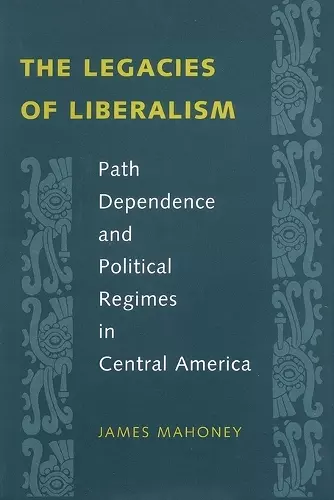The Legacies of Liberalism
Path Dependence and Political Regimes in Central America
Format:Paperback
Publisher:Johns Hopkins University Press
Published:1st Jul '02
Currently unavailable, and unfortunately no date known when it will be back

Mahoney presents a bold and multilayered argument that links developments across the nineteenth and twentieth centuries, supported through a systematic comparative analysis of all five Central American countries. The Legacies of Liberalism is the most important book on Central America written in the last ten years, an ambitious and important work that will have a significant impact on debates in a number of fields. -- Gerardo Munck, University of Illinois at Urbana-Champaign, author of Authoritarianism and Democratization: Soldiers and Workers in Argentina, 1976-1983
The book offers a general theoretical framework that will be of broad interest to scholars of comparative politics and political development, and its overall argument will stir debate among historians of particular Central American countries.Despite their many similarities, Central American countries during the twentieth century were characterized by remarkably different political regimes. In a comparative analysis of Guatemala, El Salvador, Costa Rica, Honduras, and Nicaragua, James Mahoney argues that these political differences were legacies of the nineteenth-century liberal reform period. Presenting a theory of "path dependence," Mahoney shows how choices made at crucial turning points in Central American history established certain directions of change and foreclosed others to shape long-term development. By the middle of the twentieth century, three types of political regimes characterized the five nations considered in this study: military-authoritarian (Guatemala, El Salvador), liberal democratic (Costa Rica), and traditional dictatorial (Honduras, Nicaragua). As Mahoney shows, each type is the end point of choices regarding state and agrarian development made by these countries early in the nineteenth century. Applying his conclusions to present-day attempts at market creation in a neoliberal era, Mahoney warns that overzealous pursuit of market creation can have severely negative long-term political consequences. The Legacies of Liberalism presents new insight into the role of leadership in political development, the place of domestic politics in the analysis of foreign intervention, and the role of the state in the creation of early capitalism. The book offers a general theoretical framework that will be of broad interest to scholars of comparative politics and political development, and its overall argument will stir debate among historians of particular Central American countries.
Few scholars are bold enough to try to explain 150 years of political development in five different countries, and even fewer succeed at such an ambitious undertaking. James Mahoney admirably pulls off such a feat in his masterful study of post independence political evolution in Central America... His work is to be commended not only as a seminal study of Central American politics, but also as a major contribution to scholarly understanding of critical junctures and path-dependent political development. -- Kenneth M. Roberts Perspectives on Politics A clearly written and insightful monograph, sociologists interested in comparative history will find this a rewarding read... Legacies of Liberalism makes an important contribution to the literature on national development, Latin American political economy, and comparative historical theory. -- William Canak Social Forces 2003 [Mahoney's] comparative historical analysis of political development in Costa Rica, El Salvador, Guatemala, Honduras, and Nicaragua makes a number of significant contributions. His systematic cross-case comparison is impressive in its breadth. -- Juliet Hooker Governance 2004 A provocative work of historical sociology... Mahoney's book is built around a bold thesis about nineteenth-century economic liberalism as the region's 'critical [historical] juncture.' -- Paul Gootenberg Latin American Research Review 2004
- Winner of American Sociological Association Comparative & Historical Sociology Section Barrington Moore Award 2004 (United States)
- Winner of Best Book Award in the Comparative Democratization Section 2004 (United States)
ISBN: 9780801871054
Dimensions: 229mm x 152mm x 22mm
Weight: 612g
416 pages